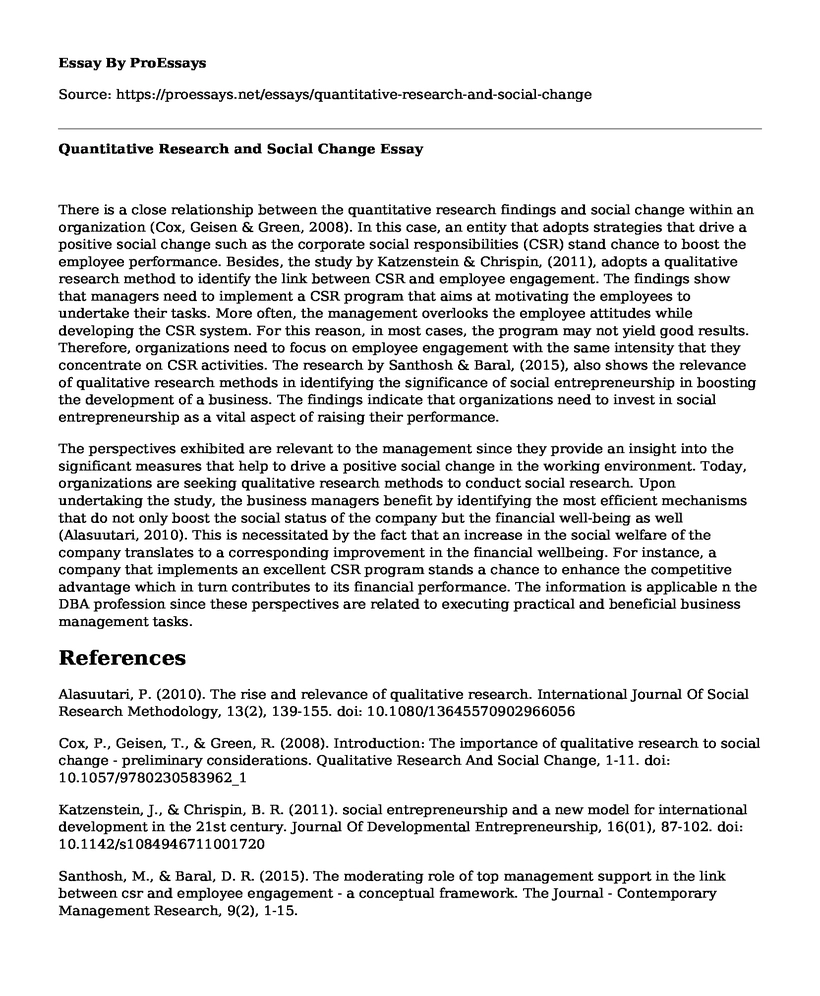There is a close relationship between the quantitative research findings and social change within an organization (Cox, Geisen & Green, 2008). In this case, an entity that adopts strategies that drive a positive social change such as the corporate social responsibilities (CSR) stand chance to boost the employee performance. Besides, the study by Katzenstein & Chrispin, (2011), adopts a qualitative research method to identify the link between CSR and employee engagement. The findings show that managers need to implement a CSR program that aims at motivating the employees to undertake their tasks. More often, the management overlooks the employee attitudes while developing the CSR system. For this reason, in most cases, the program may not yield good results. Therefore, organizations need to focus on employee engagement with the same intensity that they concentrate on CSR activities. The research by Santhosh & Baral, (2015), also shows the relevance of qualitative research methods in identifying the significance of social entrepreneurship in boosting the development of a business. The findings indicate that organizations need to invest in social entrepreneurship as a vital aspect of raising their performance.
The perspectives exhibited are relevant to the management since they provide an insight into the significant measures that help to drive a positive social change in the working environment. Today, organizations are seeking qualitative research methods to conduct social research. Upon undertaking the study, the business managers benefit by identifying the most efficient mechanisms that do not only boost the social status of the company but the financial well-being as well (Alasuutari, 2010). This is necessitated by the fact that an increase in the social welfare of the company translates to a corresponding improvement in the financial wellbeing. For instance, a company that implements an excellent CSR program stands a chance to enhance the competitive advantage which in turn contributes to its financial performance. The information is applicable n the DBA profession since these perspectives are related to executing practical and beneficial business management tasks.
References
Alasuutari, P. (2010). The rise and relevance of qualitative research. International Journal Of Social Research Methodology, 13(2), 139-155. doi: 10.1080/13645570902966056
Cox, P., Geisen, T., & Green, R. (2008). Introduction: The importance of qualitative research to social change - preliminary considerations. Qualitative Research And Social Change, 1-11. doi: 10.1057/9780230583962_1
Katzenstein, J., & Chrispin, B. R. (2011). social entrepreneurship and a new model for international development in the 21st century. Journal Of Developmental Entrepreneurship, 16(01), 87-102. doi: 10.1142/s1084946711001720
Santhosh, M., & Baral, D. R. (2015). The moderating role of top management support in the link between csr and employee engagement - a conceptual framework. The Journal - Contemporary Management Research, 9(2), 1-15.
Cite this page
Quantitative Research and Social Change . (2022, Mar 03). Retrieved from https://proessays.net/essays/quantitative-research-and-social-change
If you are the original author of this essay and no longer wish to have it published on the ProEssays website, please click below to request its removal:
- Simultaneous Comparisons and the Control of Type I Errors Paper Example
- The Importance of Random Assignment Paper Example
- Paper Example on Exploring TA & 360-Degree Feedback: A Structural Analysis
- Essay on Blackwell Medical Center: Leveraging Strengths to Overcome Weaknesses
- Clinical Research: A Cyclical Process of Engagement & Discovery - Essay Sample
- Dark Chocolate Market Trends - Free Report Sample
- Research Proposal Sample on Nike Advert







